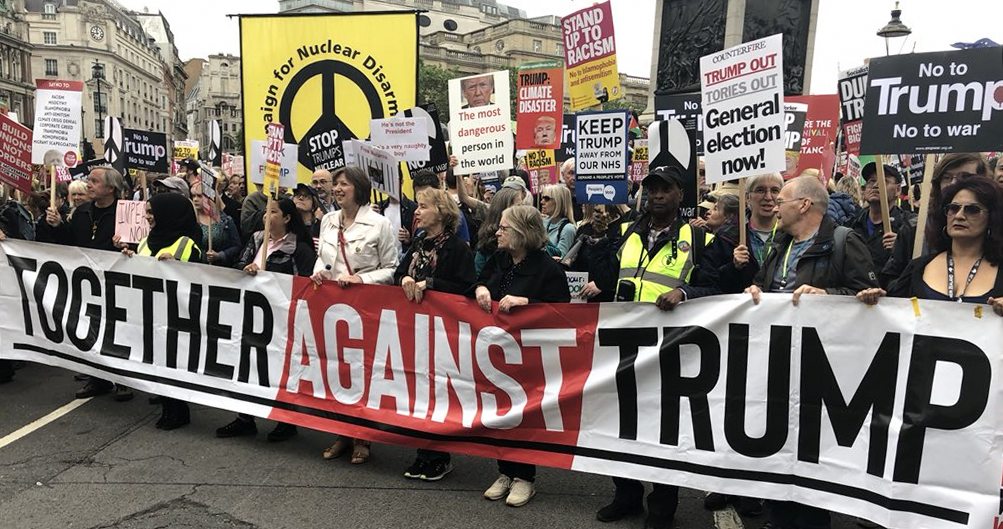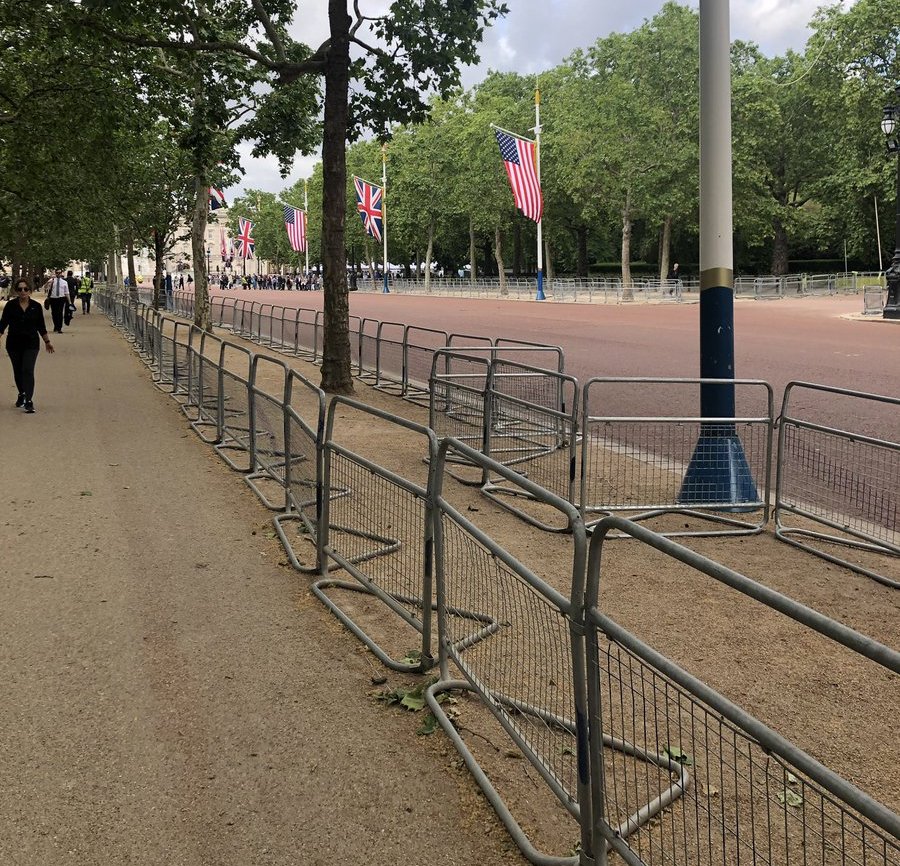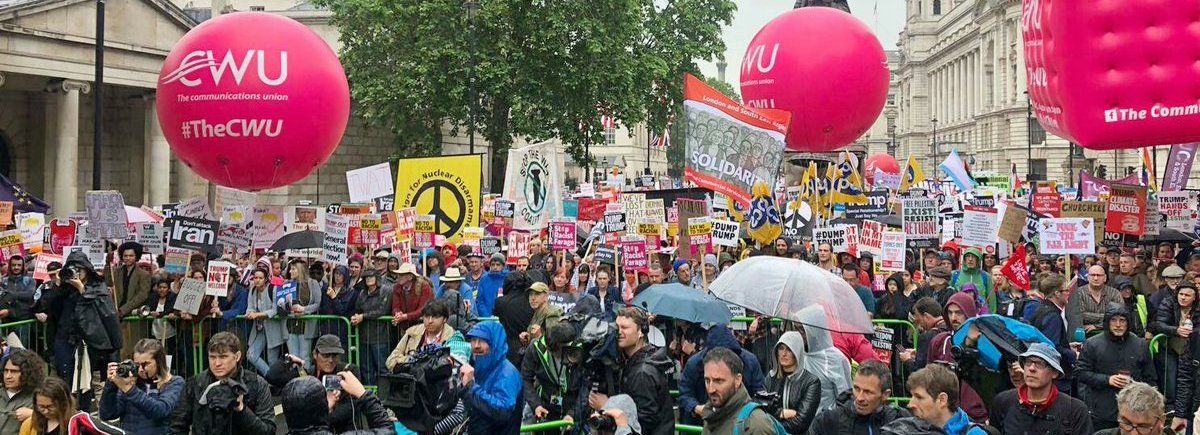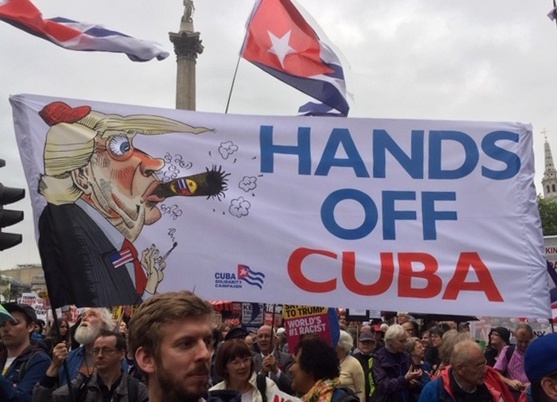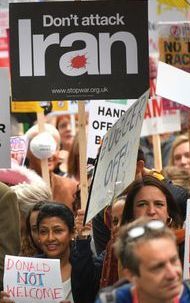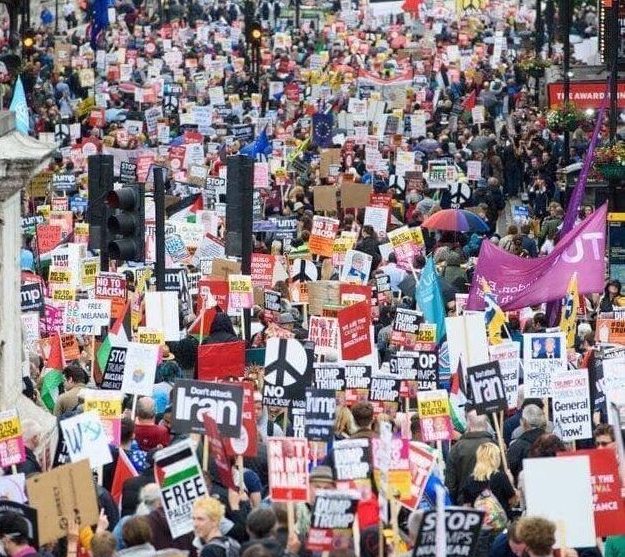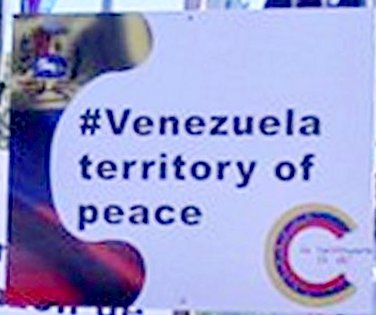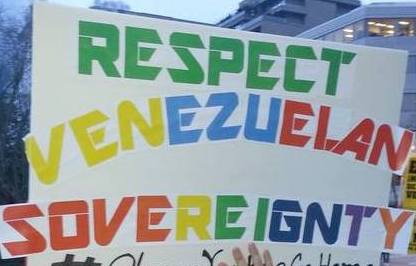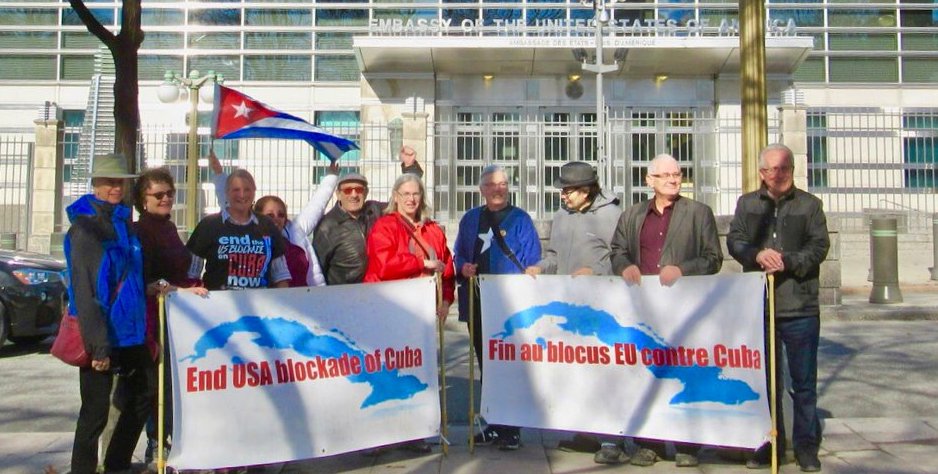
|
June 8, 2019 - No. 21 Matters of Concern to the Polity Report of National
Inquiry into Missing and Murdered Indigenous Women and Girls
|
|
|
In fact, the subject of any talks between Trump and the British government, and more, were firmly dealt with in the wide variety of placards and slogans displayed in the demonstration, and in the sectors of Trafalgar Square, the blocs, which dealt with affirming the various rights of the people, showing that the people are indeed capable of setting their own agenda.
The urgent call for an anti-war government itself, carried by activists from the contingent of Revolutionary Communist Party of Britain (Marxist-Leninist) (RCPB(ML)) and other anti-war activists, concentrated the theme of being together against Trump into a task for the present in order to safeguard the future, embodying what the people, in opposing Trump, are aspiring for. Both the British government and the Trump administration can be said to be pro-war governments. Not only that, but the theme of D-Day, June 6, embodies the heroism and striving of the people for peace against darkest reaction for which war and aggression is the first response. It is clear that the people must build their own national and international institutions to this end.
One of the central demands was that Trump and the U.S. multinationals keep their hands off the National Health Service (NHS). Trump declared in his press conference with Prime Minister Theresa May that in any trade deals between the U.S. and Britain, the NHS would be "on the table," along with everything else, before back-tracking on a subsequent occasion. But the cat was out of the bag. Even before this, the Trades Union Congress (TUC) and others were hammering on the point, "Our NHS is not for sale!"
In her speech to the rally in Whitehall, TUC General Secretary Frances O'Grady fiercely declared: "Big pharma corporations can't wait to get their greedy hands on our NHS. And Trump will back these corporate vultures all the way. We must never accept a U.S.-style system where ordinary people are cheated out of healthcare so that super-rich executives can rake in the billions. So let's send a clear message to President Trump and to whoever ends up in Downing Street in a few weeks' time. Our NHS is not for sale."
Frances O'Grady went on to say: "We shouldn't roll out the red carpet for a man who deliberately spreads fear and prejudice. Who takes the side of white supremacists, neo-fascists and women-haters. Who tears families apart and locks children in cages."
There were many other speakers, including the youth, who spoke on their future and the necessity to oppose the irresponsibility of the likes of Trump and May on climate change. Mark Serwotka of the Public and Commercial Services Union made an impassioned defence of the NHS and the staff who hail from so many parts of the world and to whom the NHS owes so much. The speakers represented the passion and commitment of so many sections of the people to oppose what Donald Trump stands for.
As the highlight of the rally, Labour Party leader Jeremy Corbyn spoke, setting the tone for the sentiment of all present. His theme was not to dwell on the outrageously negative and backward characteristics of Donald Trump -- his racism, misogyny, warmongering, and so on, though Corbyn did not mince his words on the agenda that the Trump regime is following.
"Because racism divides, exploitation of minorities divides, brings about hatred, dislike, disdain and a horrible place for individuals to live in," Jeremy Corbyn said. "When you've created that sense of hatred, destroyed people's self-esteem by that form of racism, you haven't built a house, a school, trained a nurse, defended our natural world, [you have] just created a greater sense of hate and hatred that goes with it."
But what brought the cheers of the mass of humanity there to oppose this agenda was the call for the people themselves to affirm their rights, to work together for a better world. "Think on, please, about a world that is aiming for peace and disarmament, that defeats racism and misogyny," he said, before ending his speech with the exhortation for all to join in to create that world.
The demonstration was determined to fulfil the plan to march to Parliament Square, despite the authorities having blocked the road there from Downing Street, so it set off to walk to Parliament via the Embankment. Here another militant rally took place, despite the frequent downpours, and the more open space provided the opportunity for many discussions, including with young people from the U.S. who were adamant that Trump was not their representative. This manifestation of people from all walks of life, with a multitude of creative banners and placards, clearly made the point that Trump was not welcome, and that the people must set their own agenda and build the movement for their empowerment. The many hundreds of copies of the statement of RCPB(ML) distributed were very well received and seriously read.
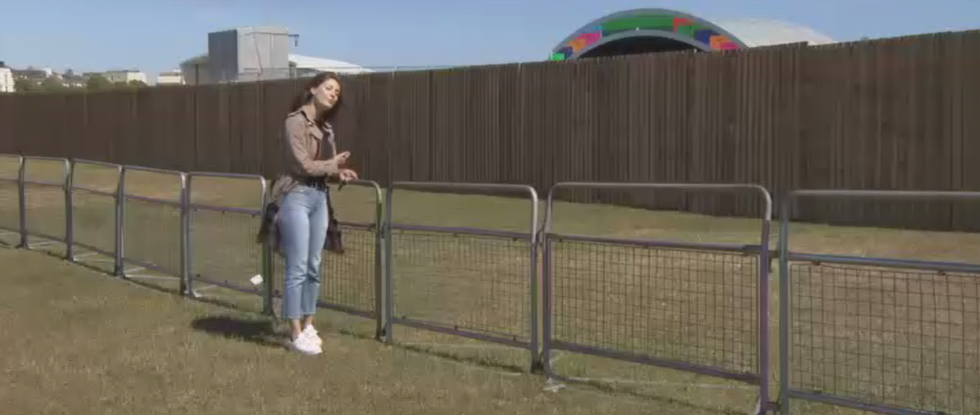
Wall in Portsmouth, prevents people from opposing Trump's
participation in
D-Day commemorations.
On the following day, June 5, a significant gathering
took
place in Portsmouth to oppose Trump and his presence at the D-Day
commemorations. The authorities went so far as to build a
wall to lock out the ordinary people from participating in the
75th anniversary activities. As well as protesting against Trump
and raising the issue of the necessity for an anti-war
government, many people paid respects also at the cenotaph, with
a minute's silence dedicated to the veterans of D-Day.
London, June 4, 2019
Newcastle, June 3, 2019
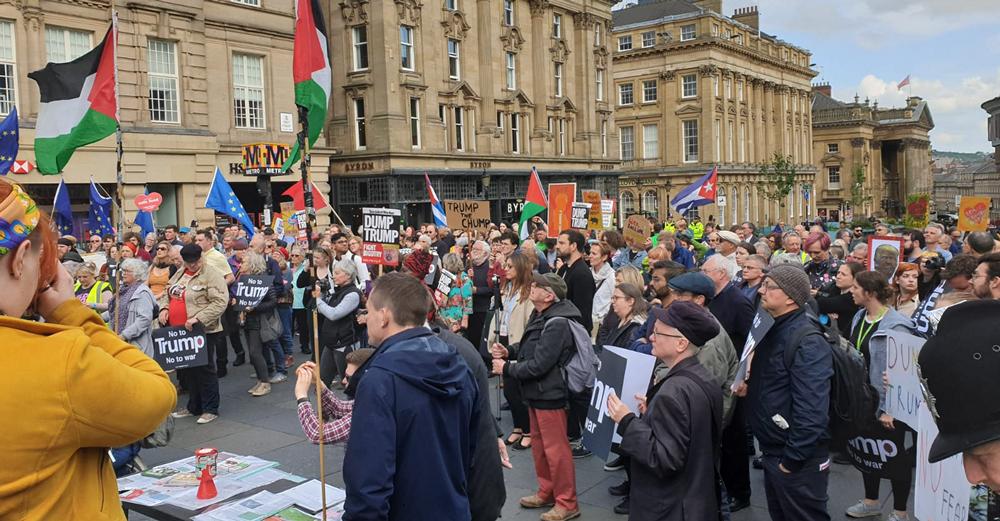

Portsmouth, June 5, 2019
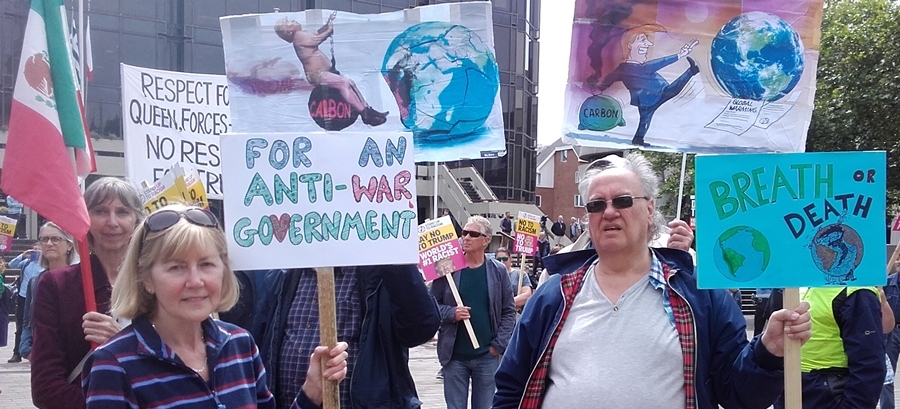
(Workers' Weekly. Photos: Stop Trump, O. Jones, B. Birchall, L. Abravenal, A. Womack, I. Infantis, M. Roberts, M. Saleem)
The Use of "Diplomatic Means" to Force Regime Change
More Desperate
Measures from the Lima Group

Picket against Ottawa meeting of Lima Group, February 4, 2019.
The Lima Group of countries[1], established to assist the U.S. in its aim of regime change in Venezuela, held its latest meeting on June 6 in Guatemala. The declaration issued at the conclusion of the meeting can be seen as yet another desperate attempt to cover up the litany of failures of the U.S. operating through its puppet Juan Guaidó and the parallel government he allegedly heads. It is full of diatribes echoing the lies emanating from the U.S that attempt to link the Venezuelan government and President Nicolás Maduro with such things as corruption, drug trafficking and "transnational organized crime" and giving protection in Venezuelan territory to "terrorist organizations and illegal armed groups."
The declaration rejects the proposal made by President
Maduro on May 20 for early legislative elections to defuse Venezuela's
political crisis and find a "political, constitutional and democratic
path forward." Instead, the Lima Group is demanding the holding of new
presidential elections to replace President Maduro, as if it is their
place to dictate such things to the people of Venezuela. Elections for
the National Assembly are scheduled for 2020; however for the past
three years the body has been declared in contempt by the Supreme
Court, and all its decisions "null and void," after it defied a
judicial order to remove three deputies accused of electoral fraud in
the December 2015 election, among other things. Furthermore
several of its members are currently detained, have fled the country or
gone into hiding, charged with active participation in the failed coup
attempt of April 30.
The declaration goes on to arrogantly call out four countries,
including Cuba, "that still support the illegitimate Maduro regime,"
urging them to become part of the Lima Group's intrigues, which it
presents as the solution to the crisis which the Lima Group is itself
fuelling.
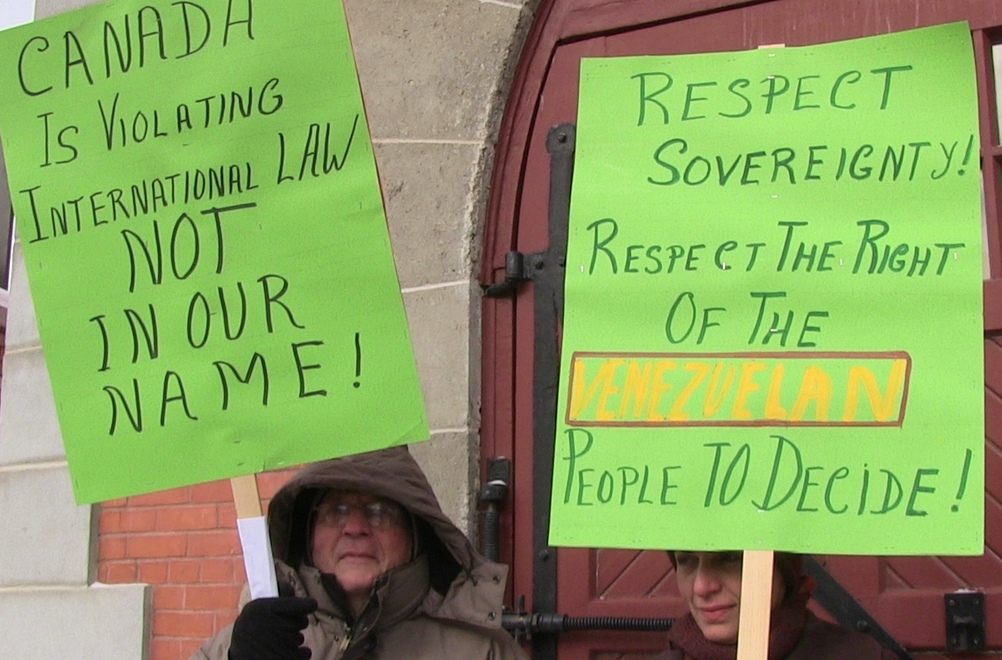 In what was said to be a
secret recording that was leaked to the Washington Post and reported on
June 5, U.S. Secretary of State Mike Pompeo, speaking to a group
of people in New York behind closed doors, expresses his frustration
with trying to work with the divided Venezuelan opposition. Pompeo said
the U.S. strategy to get rid of President Maduro is now focused on Cuba
and finding a way to "disconnect" it from Venezuela. "We're working our
tail off to try and deliver that," he said.
In what was said to be a
secret recording that was leaked to the Washington Post and reported on
June 5, U.S. Secretary of State Mike Pompeo, speaking to a group
of people in New York behind closed doors, expresses his frustration
with trying to work with the divided Venezuelan opposition. Pompeo said
the U.S. strategy to get rid of President Maduro is now focused on Cuba
and finding a way to "disconnect" it from Venezuela. "We're working our
tail off to try and deliver that," he said.
Just before Pompeo's remarks came to light, the U.S. had ratcheted up its punishing blockade of Cuba with an announcement of drastic new restrictions on travel to Cuba from the U.S., with cruise ships prohibited from docking at Cuban ports and a new ban on people-to-people educational and cultural trips, the most popular forms of travel to Cuba for U.S. citizens and those who depart from the U.S.
It is in this context that Canada's Foreign Minister Chrystia Freeland has been deployed in the role of the good cop to try to convince Cuba that its interests would be best served by "disconnecting" from Venezuela. It is not inconceivable that Canada's suspension of visa processing services in Havana, forcing Cubans to travel to a third country for this purpose, would be used as leverage for this.
On June 7, the day after the Lima Group meeting,
Freeland met in Toronto with Cuban Foreign Minister Bruno
Rodríguez Parrilla. After the meeting concluded Freeland
referred in a press conference to what she called "an international
convergence around the need for a peaceful transition in Venezuela
resulting in free and fair elections and the return to democracy," and
said "Cuba will have a role to play in this." Her words were calculated
to make it sound like she had succeeded in getting Cuba to abandon its
principled position of upholding the Venezuelan people's sovereign
right to determine their own affairs free from foreign interference to
join with a gang of governments doing the bidding of the U.S. to try to
overthrow the constitutionally elected president of Venezuela,
Nicolás Maduro, that the Liberal government terms a "peaceful
transition to democracy." This was despite the fact that Cuba's
Ministry of Foreign Affairs had made it clear in a statement issued
just days before that Cuba's principled support for President Maduro
and the Bolivarian Revolution is not negotiable.
No matter how hard the forces fomenting regime change shout that they oppose military intervention and are working for a "peaceful transition to democracy," they are already engaging in a violent assault on the Venezuelan people in the form of the deadly economic, financial and commercial blockade that is causing people to die for lack of access to medical treatment. They are also pushing for a social explosion that will be used to justify labelling Venezuela a failed state that requires a "humanitarian intervention." It must not pass.
Note
1. The Lima Group is a minority of countries in the Organization of American states, created for the sole purpose of regime change in Venezuela. It is comprised of Argentina, Brazil, Canada, Chile, Colombia, Costa Rica, Guatemala, Honduras, Panama, Paraguay, Peru and a representative of U.S. puppet Juan Guaidó claiming to represent Venezuela.
Canada Closes Its
Embassy in Venezuela
|
On June 2, Foreign Affairs Minister Chrystia Freeland announced that Canada was temporarily closing its embassy in Venezuela. In her statement Freeland said, "Unfortunately at the end of this month, the Canadian diplomats in Venezuela will no longer be in a position to obtain diplomatic accreditation under the Maduro regime, and their visas will expire. Therefore, we are left with no choice but to temporarily suspend our operation at the Embassy of Canada to Venezuela." Freeland also stated that Canada will be "evaluating the status" of Venezuelan diplomats in Canada appointed by President Maduro.
This aggressive action of the Canadian government is a continuation of its participation in the illegal U.S.-led attempt to bring about regime change in Venezuela. During the February 4 meeting of the Lima Group held in Ottawa, Canada put forward a proposal to use diplomatic means to force regime change and overthrow the democratically elected government of President Maduro. To pretend that this is defending democracy in Venezuela is a farce.
To pretend that Canada has no choice is being less than honest. According to information from the Embassy of Venezuela in Canada, Global Affairs began denying visas in January of this year by refusing to renew the visa of the Consul of Venezuela in Vancouver. This is part of a systematic plan to interfere in the legitimate activities of Venezuelan diplomats in Canada by forcing the closure of consulates in Vancouver, Toronto and Montreal.
This new crisis in diplomatic relations between Canada and Venezuela is clearly part of the U.S.-led assault against Venezuela and is a prelude to the use of force. To claim that it is the "Maduro regime that has taken steps to limit the ability of foreign embassies to function in Venezuela" is hypocritical to say the least.
Canadian and Cuban
Foreign Ministers
Hold Meeting in Toronto
Cuba's Foreign Minister, Bruno Rodríguez Parrilla, was received this Friday [June 7] by the Honorable Chrystia Freeland, Minister of Foreign Affairs of Canada, during a working visit he paid to that country. This meeting follows up on a previous meeting that both foreign ministers had in Havana on May 16 last.
The Foreign Minister of Cuba reiterated to his Canadian counterpart the concern of the Cuban authorities over the suspension of the granting of visas for Cuban citizens at the Canadian Consulate in Havana. He explained that this decision is already affecting exchanges in several areas of bilateral relations and is particularly affecting Cuban families, Canadian families and mixed families, which should go through a cumbersome procedure to get a visa, that includes the requirement to travel to a third country, with the consequent risks for their safety and the higher costs implied. He likewise reiterated that there isn't the least evidence of any risk that may jeopardize the safety of the diplomats of Canada or of any other country based in Havana. He also added that there is no reason whatsoever that may justify the withdrawal or reduction of the staff of the Canadian diplomatic mission in Havana.
During the meeting, in which other aspects related to bilateral relations were also discussed, Rodríguez Parrilla once again expressed his appreciation for the stand adopted by the Canadian government against the implementation of the Helms-Burton Act as well as for the traditional support given by Canada to the Resolution against the blockade that is adopted every year by the United Nations General Assembly.
In the meeting, both ministers exchanged on the regional and international situation. The Cuban Foreign Minister reiterated Cuba's firm and unwavering solidarity with Constitutional President Nicolás Maduro Moros, the Bolivarian Republic of Venezuela and the civic and military union of its people and called upon the Canadian minister to support the initiative of a respectful dialogue with the Venezuelan Government based on the principles of International Law and the postulates of the Proclamation of Latin America and the Caribbean as a Zone of Peace, in particular the rejection of the use and the threat of use of force, equal sovereignty and non-interference in the internal affairs of States and the implementation of unilateral coercive measures that cause humanitarian damages.
The Cuban Foreign Minister was accompanied by Josefina Vidal Ferreiro, Cuban ambassador to Canada, and other officials of the Ministry of Foreign Affairs of Cuba.
Also present at the meeting was Michael Douglas Grant, Deputy Foreign Minister of Canada.
(Cuban Foreign Ministry, June 7, 2019)
Cuba Is Not
Intimidated by Measures Adopted
to
Reinforce the
Blockade
The Revolutionary Government of the Republic of Cuba repudiates, in the strongest terms, measures announced by the United States government on June 4, 2019, reinforcing the economic blockade imposed on Cuba for more than 60 years, at a cost to the Cuban economy that in 2018 exceeded 134 billion dollars at current prices, or 933 billion dollars, when considering the depreciation of the dollar as compared to the value of gold on the international market. As is known, this new escalation, effective June 5, further strengthens the stringent restrictions U.S. citizens face in order to travel to Cuba, and adds full prohibitions on travel by sea from the United States, of all types, and prohibits cruise ship stops in our country immediately. The objective continues to be pressuring the Cuban nation to make political concessions, by strangling the economy and causing damage at the population's level. In this particular case, the measures also seek to prevent the people of the United States from learning about Cuba's reality, and thus undermining the slanderous propaganda campaigns against our country that are fabricated on a daily basis.
These actions are contrary to the majority opinion of U.S. citizens, whose interest in seeing Cuba, and exercising their right to travel, is made clear by the 650,000 who visited us in 2018, along with half a million Cubans resident in the United States.
This past April 17, National Security Adviser John Bolton, on the occasion of an anti-Cuban show that featured the presence of mercenaries defeated at Playa Girón and relatives of the Fulgencio Batista dictatorship's henchmen, announced that his government would restrict non-family trips to Cuba. It is clear that this individual has managed to take possession of U.S. foreign policy in the Western Hemisphere, which constitutes the main threat to peace and stability in the entire region. The United States promotes the Monroe Doctrine without reservation, with which it seeks to deny sovereign equality and the right to self-determination of each and every one of the hemisphere's nations.
The recent attacks on Cuba are justified with new pretexts. The most notorious among them is the slanderous accusation that Cuba is intervening militarily in Venezuela, a lie that has been publicly and consistently refuted by the Cuban government.
They go to the unscrupulous extreme of proposing that Cuba betray the convictions and principles that guide the Cuban Revolution's foreign policy, in exchange for promises of negotiations or easing of the draconian and criminal measures that make up the blockade.
Cuba's solidarity with constitutional President Nicolás Maduro Moros, the Bolivarian Chavista Revolution, and the civic-military union of its people is not negotiable. The more than 20,000 Cuban collaborators, who in a voluntary and disinterested manner offer their social services in the country, the majority in health care, will continue to do so, as long as the Venezuelan people want, cooperating with this sister country.
For Cubans, betrayal is not an option. We are not naive: we have already struggled 150 years for our independence, obliged to confront the hegemonic ambitions of U.S. imperialism since the first day. Cuba will not be intimidated, nor distracted from the essential, urgent tasks of developing our economy and the construction of socialism. Closely united, we will be able to face the most challenging adversities. They cannot asphyxiate us, nor can they stop us.
(June 5, 2019)
Call for
Hemispheric Anti-Imperialist Solidarity
Conference for Democracy and
Against Neo-Liberalism
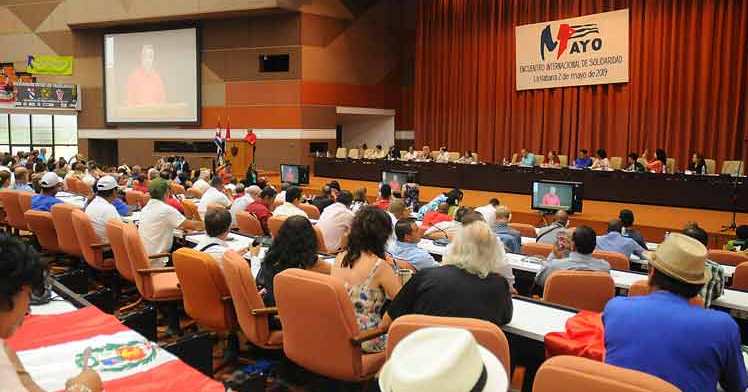
International Solidarity Conference, May 2, 2019 in Havana.
At the International Solidarity Conference for World Peace and Against War, held May 2 in Havana, peoples of the world converged to express their united demand for world peace, condemning the Helms-Burton Act and demanding an end to the economic, commercial and financial blockade imposed on Cuba for 60 years by the U.S. government, and for the return of territory illegally occupied by the U.S. Naval Base in Guantánamo.
It was in this context that Fernando González Llort, President of the Cuban Institute of Friendship with the Peoples (ICAP), invited all those present and the Cuba Solidarity Movement as a whole to take part in the Hemispheric Anti-Imperialist Solidarity Conference for Democracy and Against Neo-Liberalism, to be held in Havana, November 1-3. "No matter how dark the path, the response of the Cuban people will be to resist and victory will always be ours," said González. The call states, "Without neglecting or moving away from the specific agendas of the many struggles our organizations and movements are part of, we are aware that it will not be possible to face the enemies of our peoples in isolation, dispersed."
Thus, the call invites "the continent's networks and organizations, popular movements and left-wing political forces, the solidarity movement, campesino movements, women and feminists, trade unionists and excluded workers, environmentalists, youth and students, religious, Indigenous, ethnic, regional, and LGTBI movements... all sectors committed to the struggle to stop the advance of the neo-liberal right, to construct and defend a common emancipatory project." The second call to the Hemispheric Conference is posted in full below.
TML Weekly calls on Canadians to organize to take part in this conference that will serve as an important converging point for all those fighting for social change at home and to support those in common struggle abroad.
Text of the Call
When the Continental Day for Democracy and Against Neo-Liberalism was initiated in 2015, social and popular movements and networks of regional organizations promoted the building of links based on ecumenism and pluralism, with the main objectives being consensus, the defence of democracy, sovereignty and integration of the peoples, as well as the fight against free trade and the expansion of transnationals in the region.
Recent years have witnessed an escalation of the restoration of conservative neo-liberalism in the continent, characterized by the plunder of common property; exploitation and the precarization of work; deep indebtedness; dependence on the international financial system; migratory, environmental and food crises; religious fundamentalism; the breakdown and even destruction of formal democracy; the criminalization and judicialization of politics; the assassination of social leaders; the media war; attacks on progressive and popular organizations; hate speech and acts of hatred; racism, xenophobia, discrimination, total disrespect for human rights; and the absolute impunity with which all these abuses occur.
Without neglecting or moving away from the specific agendas of the many struggles our organizations and movements are part of, we are aware that it will not be possible to face the enemies of our peoples in isolation, dispersed.
The organizational expressions that we are fostering today through this process of coming together and of unity is not all that is called for to contribute to this effort of rebuilding links. Therefore, we have convoked networks and organizations of the continent, popular movements and left-wing political forces, the solidarity movement, campesino movements, women and feminists, trade unionists and excluded workers, environmentalists, young people and students, ecumenical, Indigenous, ethnic and territorial movements, the LGTBI and all sectors committed to the struggle to stop the advance of the neo-liberal right-wing, to the meeting in Havana in November of this year, to build and defend a common emancipatory project.
We have called the Anti-Imperialist Hemispheric Solidarity Conference for Democracy and Against Neo-Liberalism, to take place in Havana, Cuba, from November 1 to 3, 2019.
This second call to the Anti-Imperialist Conference for Democracy and Against Neo-Liberalism, which we convoked last January, is extended to the Movement in Solidarity with Cuba of our hemisphere to support the just causes that it takes up and also to reinforce the unity of struggle and resistance against the aggressive, fascist escalation of the imperialist policy led by the United States government, dragging along with it oligarchies and governments obedient to its interests. Many solidarity activists are also engaged in social struggles, while at the same time there are not a few organizations that participate in our platforms, like the Continental Day for Democracy and Against Neo-liberalism itself, which are very active in Cuba solidarity, which strengthens us both.
We invite you to attend this event and use it as a testimony to our will to fight, our solidarity and our victory; and to strengthen and broaden our links as much as possible with the greatest number and diversity of organizations, movements and social expressions takes root in our countries, at the base of our organizations.
We want to meet in Havana to advance a common strategic agenda and plan of action at the hemispheric level in defence of democracy and social justice for our peoples, where solidarity with all just causes is an essential weapon.
It is necessary to develop communication strategies to participate effectively in the battle of ideas, expand and strengthen the convergence of our organizations' media and ways of waging struggle, overcome differences and commit ourselves to unity in action based on dialogue about traditions, accumulated different experiences and emerging alternatives.
Cuban social, political and mass organizations and the Cuban Institute of Friendship with the Peoples once again offer a territory symbolizing rebellion, resistance and alternatives; a space of trust, solidarity and commitment to constructing paths of struggle.
Continental
Day
for
Democracy
and
Against
Neoliberalism
Cuban
Chapter
of
Social
Movements
Cuban
Institute
of
Friendship
with
the
Peoples
To
confirm
your
participation
in
the
Conference,
send
a
message
to
the
following
email
addresses:
enc.jornada2019@gmail.com
icap@icap.cu
(Edited for style and grammar by TML. Photo: Prensa Latina)
Argentina
Workers' Movement
Response to Worsening
Neo-Liberal
Crisis
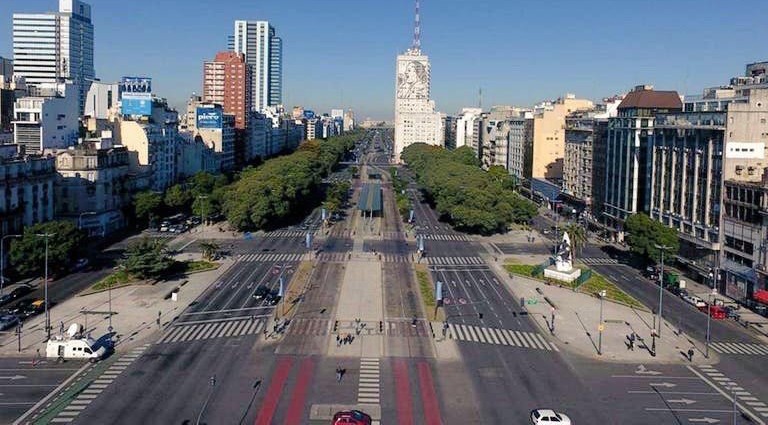
The streets of Buenos Aires are empty during the May 29, 2019 general
strike against the Macri government's neo-liberal anti-social
offensive.
On Wednesday, May 29 workers in Argentina waged their
fifth general strike against the neo-liberal administration of
President Mauricio Macri since it took power in 2015. The strike, which
lasted 24 hours, was called by the country's largest union central, the
General Confederation of Labour.
Public transportation was shut down all day and no domestic or
international flights took off or landed at the country's main
airports. Classes at elementary and secondary schools and universities
were interrupted, as were banking and public health services as workers
in all these sectors joined the strike. Members of social movements and
others joined workers from the 70 participating unions in the streets,
with some activists giving out free food from big pots to show that
people are going hungry because of the harsh austerity measures imposed
by the government and the International Monetary Fund (IMF).
In a country like Argentina, which has such a strong history of trade
unionism, general strikes are considered to be a clear warning to
incumbent presidents, although a significant reduction in unionization
in recent years means the impact is clearly less than it used to be. As
well, despite these general strikes, the workers' movement is far from
united as a result of divisions and leadership factions with different
aims and agendas. Nonetheless, because the situation is so serious, the
unions have managed to act in concert and unite to strongly protest the
austerity pushed by Macri's government and the IMF. Now the government
is looking to negotiate with various leaders of the General
Confederation of Labour and the
Argentine Workers' Central, the second largest union umbrella
organization, to try and head off another general strike before the end
of the year.
An Unsettling Scenario

Demonstration by teachers and students, May 16, 2019, against cuts to
education funding.
Argentina is currently going through an appalling
economic situation, with economic activity dropping by 6.8 per cent
from
March 2018 to March 2019 and there is no sign of recovery or
improvement in the
foreseeable future. Argentina's public debt already amounts to
approximately U.S.$332 billion and represents 86.2 per cent of the GDP,
according to the Foreign Debt Observatory of the Metropolitan
University for Education and Work. Foreign debt makes up the
lion's share, with over $187 billion in foreign debt issues having been
undertaken since Macri took office in 2015. According to resolutions on
the Ministry of Finance's books, the government has shamelessly
surrendered sovereignty over the nation's natural resources by putting
them up as collateral to guarantee foreign debt holders their pound of
flesh -- one way or another.
Meanwhile, there is a general election coming in October and both
foreign and local eyes are on Argentina and its debt. There are two
main possible outcomes discernible for that election at this stage,
according to different polls. One is the re-election of the current
administration and continuance of the disastrous economic model Macri
and the oligarchs behind him have imposed on the country. The second
one would seem to be that the opposition, led by the Peronist movement
with the ticket of Alberto Fernandez for President and former President
Cristina Fernandez de Kirchner for Vice-President, takes office and
tries to change that model into one more focused on the revival of the
domestic market and industrial activity.[1]
The preoccupation of the financial oligarchy is that Argentina will not
make its debt payments, despite assurances from prospective candidates
that they will be made. In order to get a U.S.$56 billion IMF bailout,
Macri's government committed to achieving a balanced budget in 2019 and
a surplus in 2020 by imposing harsh structural adjustment measures. In
spite of the rosy scenario painted by the government to try and sell
its anti-social, anti-national agenda, economic pundits are predicting
that the IMF austerity measures will remain in place for at least ten
more years. Of course this assumes that the working people are not
going to succeed in organizing to realize their own demands based on
their stand that enough is enough, and organize to put an end to the
situation whereby all the resources of the nation are appropriated to
pay the rich.
Social Response

Streets of Buenos Aires during twenty-four hour general strike, April
6, 2017 against neo-liberal policies of Macri government, which
coincides with the opening of the World Economic Forum on Latin America
being held in the city.
Since the creation of the Cambiemos (Let's Change)
electoral alliance between Macri's Republican Proposal Party and the
Radical Civic Union in the lead-up to the 2015 election, the social
situation has grown increasingly worse, as different indicators have
shown. For example, in the past year, poverty has risen 32 per cent and
employment has decreased by 2.2 per cent.
Another indicator of the worsening situation is the successive large
protests and marches, the most recent being the May 29 general strike.
Work stoppages and demonstrations are likely to continue in different
sectors of the economy.
 In recent years, the
Argentine people, workers and trade unions have taken to the streets to
protest not only the economic model based on austerity
followed by Macri and his government, but also to call for the
re-establishment of collective bargaining and a reduction in
income taxes for workers whose purchasing power has plunged in the face
of 54 per cent inflation, unceasing utility rate hikes and strong
currency devaluation. To give a broader view of the problem, protests
have also extended to sectors like the scientific community, which has
been forced to suffer a brutal adjustment, with scholarships and
grants for research having dropped dramatically since 2015.
In recent years, the
Argentine people, workers and trade unions have taken to the streets to
protest not only the economic model based on austerity
followed by Macri and his government, but also to call for the
re-establishment of collective bargaining and a reduction in
income taxes for workers whose purchasing power has plunged in the face
of 54 per cent inflation, unceasing utility rate hikes and strong
currency devaluation. To give a broader view of the problem, protests
have also extended to sectors like the scientific community, which has
been forced to suffer a brutal adjustment, with scholarships and
grants for research having dropped dramatically since 2015.
"The [tactic of a general] strike has been followed because there has
been no response, no government reaction to our demands," said Hugo
Moyano, leader of one of the General Confederation of Labour branches.
"There's a huge amount of
discontent with the government. Many workers voted for this government
because it was going to get rid of income tax. They trusted it but this
time they won't make the same mistake," said Moyano, referring to the
upcoming elections on October 27.
Other union leaders expressed themselves on this topic as well. Hugo
Yasky, General Secretary of the Argentine Workers' Central said that
"the [May 29 strike]
consolidates the hope that in October we are going to vote and defeat
this government that is a testimony to a failed experiment of the
Argentine right."
He said Macri's Cambiemos alliance sold itself initially "as an
expression of modernism, but ended up taking us back to the same
disaster and the same destruction of the neo-liberalism of the '90s."
Note
1. Peronism refers to the Argentine political
movement based on
the ideology of former President Juan Domingo Perón, that dates
back to 1946, when Perón was elected to office for this first of
three tenures. The "three flags" of Peronism are said to be social
justice, economic independence and political sovereignty.
(With files from TeleSUR, Trading
Economics, AFP.)
Public Forum in Toronto on June 15
For Peace,
Security and Denuclearization
of the Korean Peninsula
Saturday, June 15 -- 2:00-6:00 pm
TNG Community Centre, 349 Ontario Street
Organized by: Korea Truth Commission (Canadian Chapter)
and Korean Federation in Canada
For more information call 416-768-1107 or email: corfedca@yahoo.ca
 Keynote
Speaker: Professor Kiyul Chung, 21st Century Institute, Washington,
DC;
Distinguished Visiting Professor, Kim Il Sung University, Pyongyang,
DPRK
Keynote
Speaker: Professor Kiyul Chung, 21st Century Institute, Washington,
DC;
Distinguished Visiting Professor, Kim Il Sung University, Pyongyang,
DPRK
Everyone is warmly invited to a public forum on the struggle for peace,
security and denuclearization of the Korean Peninsula on the occasion
of the 19th anniversary of the historic June 2000 North-South Joint
Declaration signed by the Democratic People’s Republic of Korea (DPRK)
and the Republic of Korea (ROK).
This forum is taking place in the context of recent developments,
including the Panmunjom Declaration between the DPRK and ROK in April
2018, and the subsequent DPRK-U.S. Summits in Singapore in June 2018
and in Hanoi in February 2019. These developments have created the
potential for a new era of peace on the Korean Peninsula and
normalization of relations between the DPRK and the U.S. by
establishing a process of reciprocal steps to end the past history of
hostility and confrontation. However, progress toward a solution based
on mutual interest has been blocked by the insistence of the U.S. side
on unilateral demands for the dismantling of the legitimate defence
capacity of the DPRK.
|
|
(To access articles individually click on the black headline.)
Website: www.cpcml.ca Email: editor@cpcml.ca
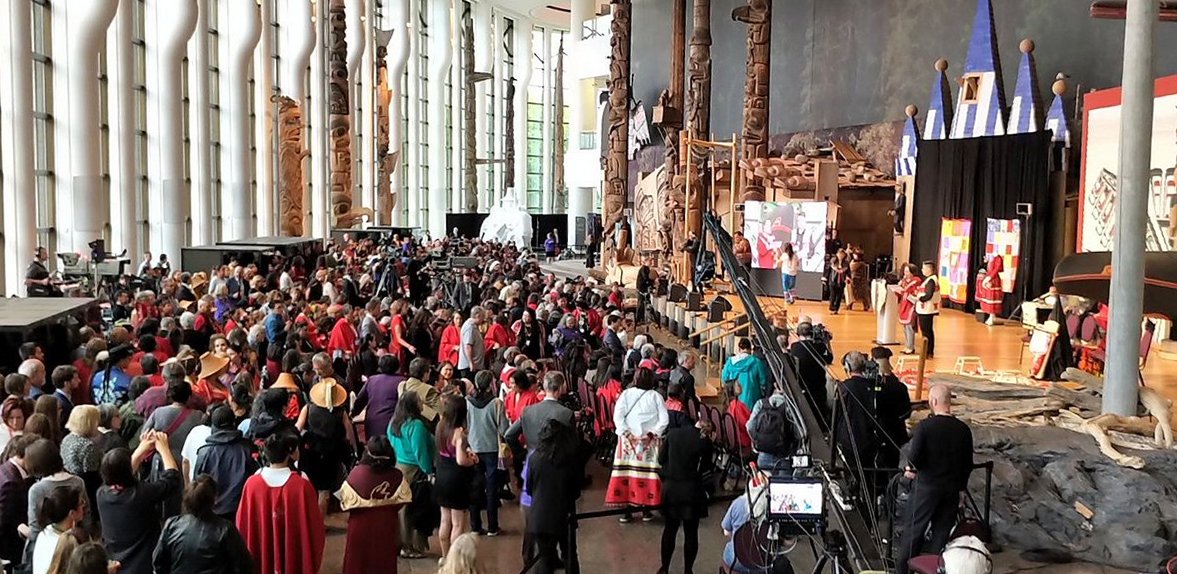

 Not a few media,
pundits and politicians have contested this finding. Their response is
disturbing on many levels, but none more so than the anxiety it causes
because it seeks to divert the discourse into a racist morass which
blames the people for their plight. Some media coverage of the release
of the National Inquiry's final report highlights the Liberal
government's failure to address the historical crimes committed by the
Canadian state against the Indigenous peoples. Meanwhile, the response
of the Trudeau government is also informed by the ongoing colonial
relations and decision-making process it imposes on the Indigenous
peoples to this day. As its first violation of principle in the
relationship with the Indigenous peoples, Canada refuses to give up the
prerogative powers usurped by the Crown and establish nation-to-nation
relations. It also refuses to provide redress for all the crimes
committed against the people and put in place the conditions required
for the Indigenous peoples to exercise their right to be.
Not a few media,
pundits and politicians have contested this finding. Their response is
disturbing on many levels, but none more so than the anxiety it causes
because it seeks to divert the discourse into a racist morass which
blames the people for their plight. Some media coverage of the release
of the National Inquiry's final report highlights the Liberal
government's failure to address the historical crimes committed by the
Canadian state against the Indigenous peoples. Meanwhile, the response
of the Trudeau government is also informed by the ongoing colonial
relations and decision-making process it imposes on the Indigenous
peoples to this day. As its first violation of principle in the
relationship with the Indigenous peoples, Canada refuses to give up the
prerogative powers usurped by the Crown and establish nation-to-nation
relations. It also refuses to provide redress for all the crimes
committed against the people and put in place the conditions required
for the Indigenous peoples to exercise their right to be.





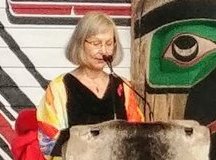
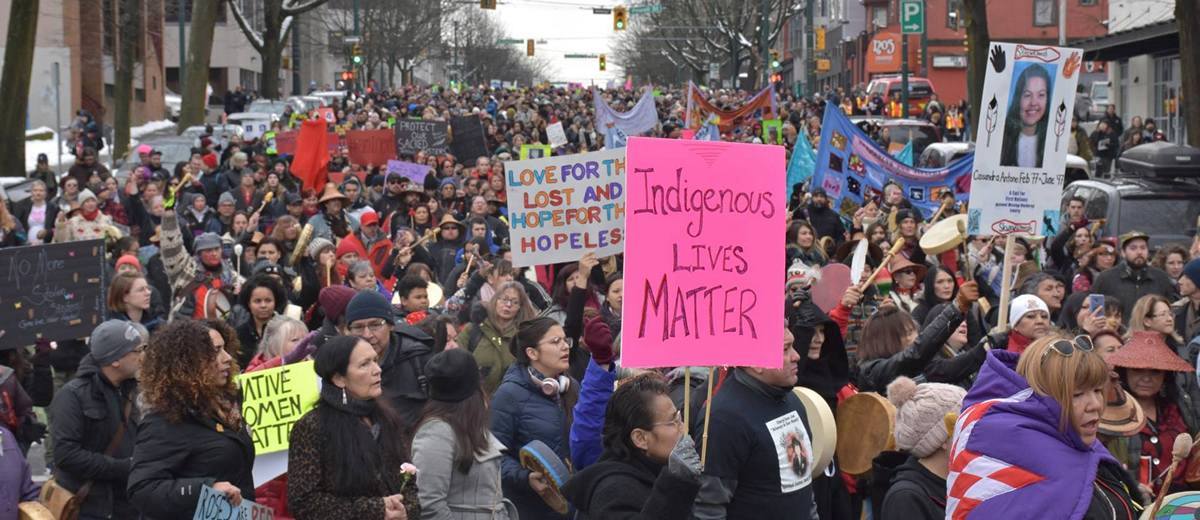
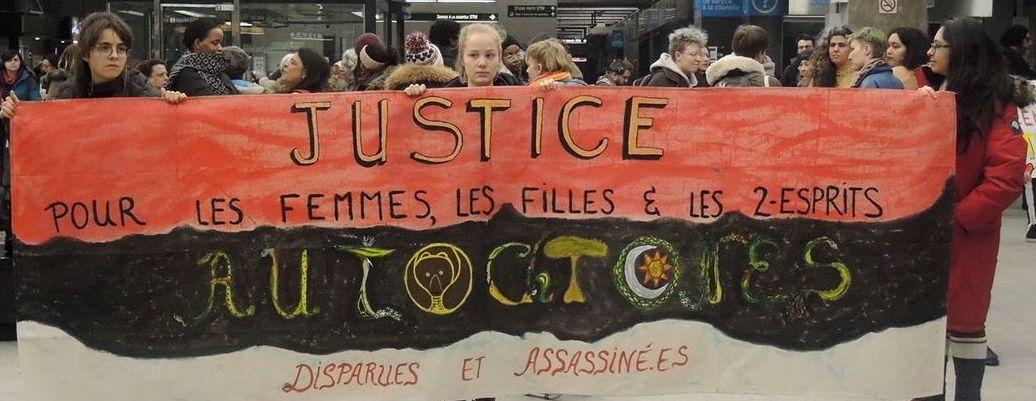
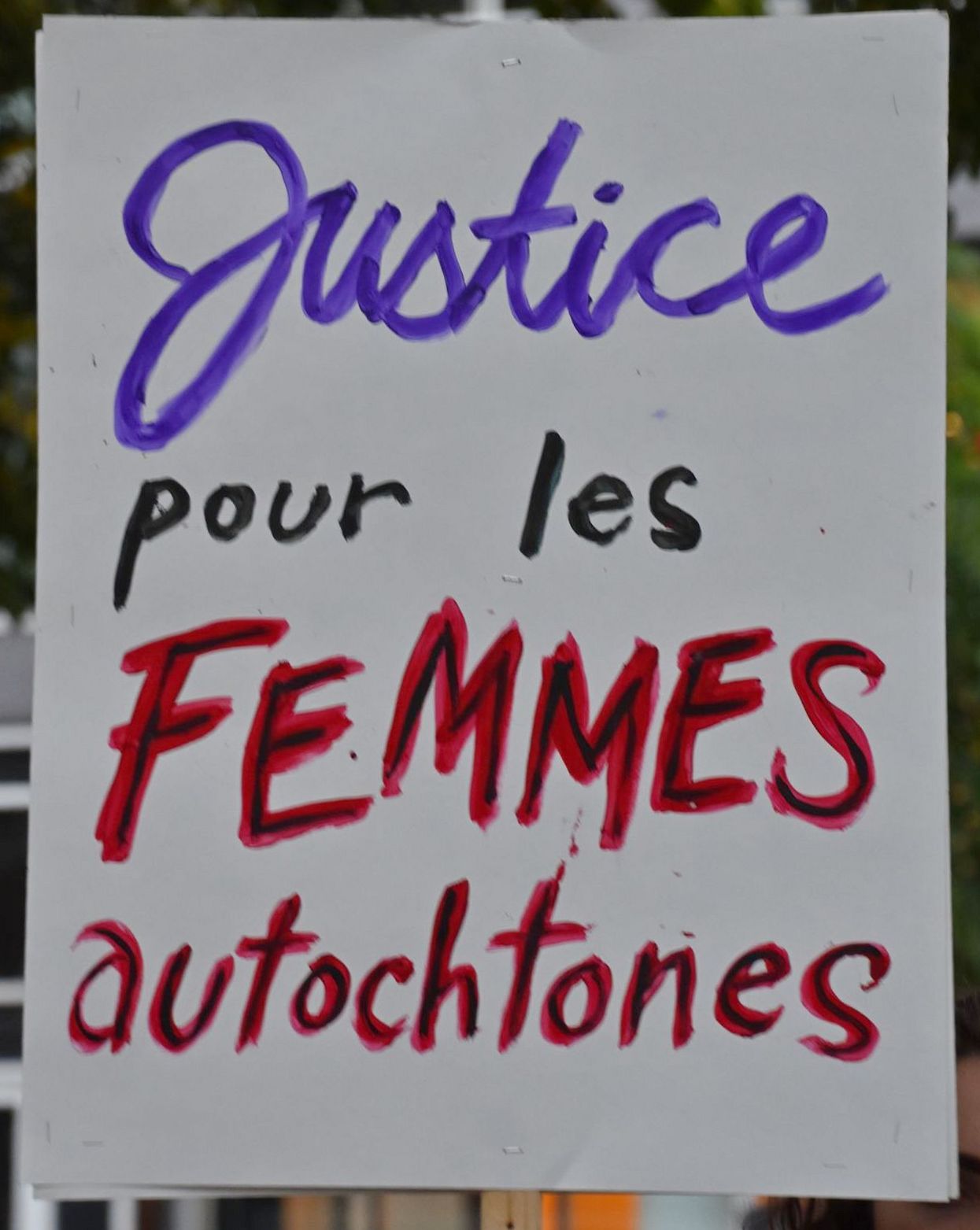 "Quebec's political and
socio-historical context is different
from the Canadian context. The James Bay and Northern Quebec
Agreement (JBNQA) in 1975 and the Northeastern Quebec Agreement
in 1978 represent so-called 'modern' treaties concluded between
the Crown and First Nations that are applicable in what is now
called Quebec, for example the 1760 Huron-British Treaty and the
Treaty of Oswegatchie.
"Quebec's political and
socio-historical context is different
from the Canadian context. The James Bay and Northern Quebec
Agreement (JBNQA) in 1975 and the Northeastern Quebec Agreement
in 1978 represent so-called 'modern' treaties concluded between
the Crown and First Nations that are applicable in what is now
called Quebec, for example the 1760 Huron-British Treaty and the
Treaty of Oswegatchie. "Blueberry River First
Nations has been forced to turn
back to
the Courts to enforce our treaty rights against the Province of
British Columbia. [...] We are going to trial to protect our
treaty rights and our future generations against the impacts of
further development in our territory.
"Blueberry River First
Nations has been forced to turn
back to
the Courts to enforce our treaty rights against the Province of
British Columbia. [...] We are going to trial to protect our
treaty rights and our future generations against the impacts of
further development in our territory.
